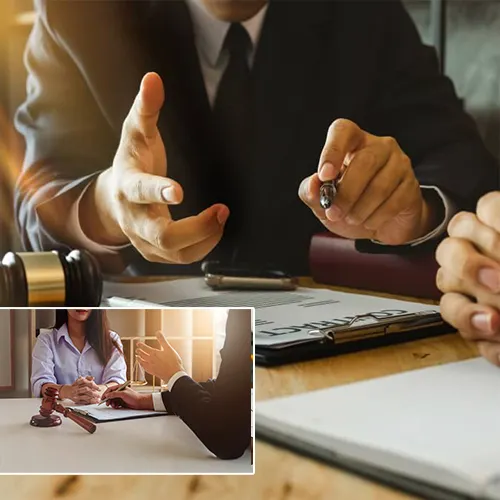Guidelines for Interacting With Police: Navigating a DUI Stop
Table of Contents []
Interacting With Police DUI Stop
Understanding Your Rights and Responsibilities During a DUI Stop

| Stay Calm | Be Respectful | Know Your Rights |
Being pulled over by the police can be a stressful experience, especially if you are being stopped on suspicion of driving under the influence (DUI). At [%COMPANY NAME]%, we understand how crucial it is to be equipped with the right knowledge during this time. It's not just about the law; it's about ensuring everybody's safety-yours and the officer's. That's why we provide guidance on how to interact respectfully and legally with law enforcement to help avoid any unnecessary escalites.
If you find yourself in a DUI checkpoint or being stopped for suspected DUI, here's what you should remember:When the lights go on, safely pull over to the side of the road as soon as you can. Remain calm, keep your hands on the wheel, and avoid making sudden movements. Be courteous when speaking with the officer and provide your driver's license, vehicle registration, and proof of insurance when asked. However, it's also crucial to be informed about your rights and the scope of what an officer can lawfully do.
When interactions don't go as expected, and if you believe there was any legal mishandling in the process, it's essential to have access to professional support. We can link you with skilled attorneys to address any concerns that might arise from the interaction. Remember, if you need to reach out for guidance or to set up an appointment with us, our lines are open at (512) 686-4293.
What to Do When You're Being Signaled to Stop
Observing the right protocols when signaled to pull over can alleviate tensions and demonstrate compliance. First, signal your intention to pull over, and gently apply the brakes. Look for a safe, well-lit area to come to a complete stop. Once you've stopped, turn off your engine, roll down your window, and keep your hands visible. This shows that you're ready to cooperate and can have a calming effect on the situation.
An encounter with the police is no time for surprises. Clear communication and cooperation go a long way. While it might be instinctual to start explaining your situation right away, it's typically best wait for the officer to speak first. They will guide you through the process and let you know what they would like from you.
Communicating with the Officer
Your demeanor during a police stop can set the tone for the entire interaction. Address the officer politely and answer questions directly. If you don't understand a question, it's acceptable to ask for clarification. Staying composed and cooperative can lead to a more positive outcome, potentially even if you're issued a warning or citation.
However appealing it might seem to argue your point on the roadside, it's not the place to debate a charge. Keep in mind that everything you say and do can be used in future legal proceedings, so it's important to think before you speak. If you disagree with the officer's assessment, there will be an appropriate time and place to dispute that in court.
Refusing Tests and Search Requests
You may wonder about your rights regarding breathalyzer tests or vehicle searches. While laws may vary by state, implied consent laws generally mean that by driving on the road, you've agreed to such tests. Refusing them could lead to penalties. As for vehicle searches, you are within your right to refuse consent for a search if there is no warrant or probable cause.
Remember, asserting your rights should always be done calmly and respectfully. An aggressive response could escalate the situation. If you're unsure about the right approach, that's where our resources come in. We can offer guidance on how to handle such requests while respecting the law and officer's duties.
After the Stop: Seeking Legal Help
If you've adhered to the protocols but believe the officer didn't, reaching out for legal advice is the next step. Whether it's a question about the stop's legality or the conduct during the interaction, expert legal counsel can help you navigate these waters. At Bain Lee Norton, we connect you with professionals who specialize in DUI laws and can advocate on your behalf.
Contacting us sooner rather than later is usually better. Timeliness can be critical when collecting evidence or reviewing details of your case. Don't hesitate to get in touch at (512) 686-4293 to discuss your situation and explore your options. We're here to ensure you receive fair treatment under the law.
Empowering Yourself with Knowledge and Legal Support

Knowledge is power, and nowhere is this truer than during a DUI stop. At Bain Lee Norton, we believe informed drivers are better equipped to handle the complexities of these interactions. Understanding the law, knowing what your rights are, and how to exercise them properly can defuse tension and create an atmosphere of mutual respect between you and the officer.
Equally important is having the foresight to seek out professional help when it's needed. Legal issues can be perplexing, but you don't have to navigate them alone. Our team provides the resources to guide you, and if the situation calls for it, the link to a network of dedicated attorneys who can intervene on your behalf.
Educating Yourself on DUI Procedures
Preparation starts with education. By understanding the procedures officers follow during a DUI stop, you empower yourself to act appropriately. Officers are trained to look for signs of impairment, and they'll explain why you've been stopped and what they need from you. Familiarizing yourself with these protocols helps you to anticipate the officer's requests and respond accordingly.
Another component is knowing about field sobriety tests and chemical tests, such as breathalyzers. There's a fine line between cooperation and protecting your rights. Our resources aim to help you walk that line confidently.
Building a Relationship with Your Attorney
If you end up needing an attorney, the relationship you build with them is key. You want someone who understands not only the law but your specific circumstances. Someone diligent, persistent, and who has your best interests at heart. Our network includes attorneys who are well-versed in DUI regulations and will fight to ensure the law is applied justly in your case.
The sooner you get an attorney involved after a DUI stop, the better. They can begin investigating, gathering evidence, and preparing your defense. Remember, having an attorney doesn't mean you're guilty; it means you're serious about asserting your rights.
The Importance of Acting Quickly
Time is of the essence when dealing with DUI charges. The legal system can be unforgiving, and missed deadlines can have severe repercussions. That's why it's critical to act swiftly and get the wheels of justice turning in your favor.
An initial consultation can provide a clearer understanding of your situation and what steps you'll need to take next. That's why we encourage you to reach out to us at [%PHONE%] without delay. The right move now can make all the difference later.
Creating a Defense Strategy
Once you've connected with an attorney, it's time to strategize. Every DUI case is unique, which means your defense should be tailored to your specific scenario. Analyzing the evidence, reviewing the officer's conduct, and considering any potential violations of your rights are all steps your attorney will take.
Having a robust defense strategy is key, and it begins with understanding the details of your case. Our attorneys have the expertise to interpret the law and craft a defense plan that represents your best chance at a fair outcome.
Tips for Maintaining Composure During a DUI Stop

Staying Calm Under Pressure
It's natural to feel anxious during a DUI stop, but remaining calm is crucial. Take deep breaths and focus on the present moment. Avoid making rash decisions or statements that you may regret later. An officer is more likely to respond favorably to someone who is composed and not confrontational.
Keep in mind that officers are often on heightened alert during traffic stops for their own safety. Ensuring that your movements are slow and deliberate can help to reassure them and reduce the risk of misunderstandings.
Polite and Respectful Interaction
Respect goes a long way. Addressing the officer as "Officer" or "Sir/Madam" is not only courteous but also sets the stage for civil dialogue. Being polite may not change the outcome of your stop, but it can prevent the situation from worsening. Remember that you're engaging with a person who has a duty to enforce the law, and kindness can have a positive impact.
Even if you feel the stop is unwarranted, arguing with an officer on the side of the road is not advisable. There's a time and place to contest any grievances, and that's typically in court-not during the interaction.
Handling Anxiety and Stress
Dealing with stress and anxiety effectively is critical. Having a plan can help, such as practicing what to say and do if you're stopped. Run through scenarios in your mind so that you can be better prepared for the real thing. Being prepared can help mitigate nervousness and ensure you communicate clearly.
Also, consider simple stress-relief tactics like focusing on your breathing or positive visualization. The goal is to maintain a level head so that you can handle the situation with thoughtfulness and composure.
Bearing in Mind the Consequences of Escalation
Remember, escalating the situation will likely not be in your favor. Arguing with the officer or becoming confrontational can lead to additional charges or complications. Keeping a clear head and being aware of your conduct is important. It's your behavior that can tip the scales toward a more favorable result.
Ever heard the saying "choose your battles wisely"? Well, that applies here. Know when to speak up and when to let your attorney do the talking later on. Our attorneys know how to handle disputes with the police and can work on your behalf to challenge any issues with the stop or your arrest.
The Role of Legal Assistance in a DUI Situation

Assessing the Validity of the Stop
Our attorneys can assess whether the initial stop was valid. Law enforcement must have a reasonable suspicion of law-breaking to justify pulling you over. If this can't be established, your attorney might argue that the stop was unlawful, which could lead to evidence being thrown out in court.
Each detail of the stop matters in building your defense. If your rights were violated or if the officer failed to follow proper protocol, it could significantly impact your case.
Navigating the Complexities of DUI Laws
DUI laws are complex and vary from state to state. Understanding these laws is essential to navigating your DUI stop and subsequent proceedings correctly. Our attorneys are well-versed in the nuances of DUI law and can explain what they mean for your case.
Whether it's interpreting the results of a sobriety test or contesting the manner in which evidence was obtained, your attorney can provide the expertise needed to navigate these complexities with confidence.
Understanding the Role of Evidence
Evidence plays a critical role in DUI cases. The prosecution will use it to establish guilt, while your defense will examine it for flaws and inaccuracies. An experienced attorney knows what evidence to look for and how to challenge its validity.
Was the breathalyzer properly calibrated? Were the field sobriety tests administered in line with established procedures? These are types of questions your lawyer will investigate.
Building a Strong Legal Defense
A strong legal defense can mean the difference between conviction and acquittal. Good attorneys do more than just show up in court; they dig deep into the evidence and use their knowledge and experience to build a compelling defense. They are your advocates and will diligently strive to protect your rights every step of the way.
Keep in mind, the charge of DUI is serious, but having a team on your side helps balance the scales. Reach out to us, and let's start planning your defense together. For immediate assistance or to schedule a consultation, call us now at (512) 686-4293.
Take the Next Step: Contact Bain Lee Norton for Support

Facing a DUI stop can be daunting, but you're not alone. At Bain Lee Norton, we recognize how imperative it is to not only act appropriately during the interaction with law enforcement but also to understand your legal rights and options afterward. We are committed to providing resources that assist you every step of the way, empowering you with knowledge and linking you to legal professionals who can advocate for you if necessary.
Stay knowledgeable, stay prepared, and remember that we are here to help. For answers to your questions, more information on how to handle a DUI stop, or to book an appointment with us, don't hesitate to get in contact at (512) 686-4293. Embrace the support and guidance available to you through Bain Lee Norton and take control of your situation today.
Previous Page
